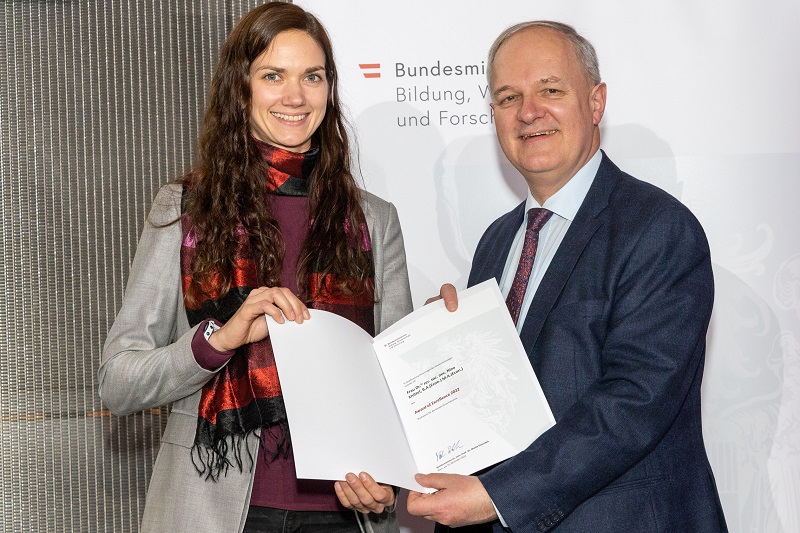Für ihre Dissertation wurde Nina Knittel im Dezember 2022 mit dem "Award of Excellence" des Bundesministeriums für Bildung, Wissenschaft und Forschung augezeichnet. Betreut wurde die Arbeit von Birgit Bednar-Friedl vom Institut für Volkswirtschaftslehre. Wir gratulieren herzlich!
Award of Excellence – Staatspreis für die besten Dissertationen: Mit diesem Staatspreis, der aus Mitteln der Studienförderung finanziert wird und mit 3.000,-- Euro dotiert ist, werden seit 2008 die 40 besten Dissertationen des abgelaufen Studienjahres honoriert. Die Vorschläge dafür kommen von den Universitäten. Die feierliche Überreichung der Preise erfolgt im Dezember jedes Jahres.
Nina Knittel ist promovierte Volkswirtin und Mitglied der ökonomischen Forschungsgruppe am Wegener Center für Klima und Globalen Wandel der Uni Graz. Ihre Hauptforschungsgebiete sind die makroökonomischen Auswirkungen internationaler Klimawandelfolgen sowie Kosten und Nutzen von Klimawandelanpassung. Ihre methodische Expertise liegt in der quantitativen Modellierung, genauer gesagt in der computergestützten allgemeinen Gleichgewichtsmodellierung (CGE).
Mehr zur Dissertation >> Public and private responses to climate change: An economic assessment of climate change impacts and adaptation with a focus on public budgets and global trade relations
Climate change poses major challenges for today's societies. In addition to the strategies needed to halt its progress, solutions must be found to deal with the negative consequences of global warming. Public actors, such as the state, are often responsible for taking the necessary precautions, as they own public infrastructure or step in when private actors are insufficiently prepared in the event of a disaster. These responsibilities can put a burden on public budgets. Moreover, climate change is not a regional phenomenon, but affects natural, economic and social systems around the world. Through international linkages such as global trade relations, these systems are interconnected, and climate change impacts can cause damages distant from their point of origin. In the first part of my thesis, I deal with fiscal consequences of climate change with a focus on different adaptation options, such as flood protection or insurance. In the second part of this thesis, I analyse and quantify globally transmitted climate change impacts and identify options for dealing with these impacts. The economic quantifications are undertaken for 2050 by means of a Computable General Equilibrium model. The comprehensive macroeconomic analysis of public expenditures on climate change adaptation considers both mitigation of climate change-induced damages and employment effects and shows that positive effects of adaptation outweigh additional public expenditures. The assessment of globally transmitted climate change impacts highlights the vulnerability of European countries to impacts in other world regions and suggests that by ignoring these impacts the full costs of climate change are substantially underestimated.


